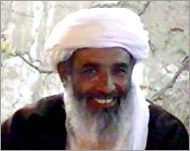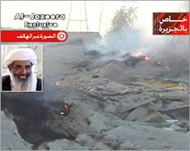Profile: Abu Hafs al-Masri
The group known as Abu Hafs al-Masri Brigades’ has been surfacing more and more in recent months.

It has claimed responsibility for several deadly attacks in Iraq since the fall of Baghdad last April. The brigades were named after the training commander of al-Qaida network and were founded after his death in 2001.
Personal background
Abu Hafs was an Egyptian national, who was nicknamed al-Masri meaning ‘the Egyptian’ in Arabic.
He was a core member of the Islamic Jihad group, which successfully carried out the assassination of the Egyptian president Anwar al-Sadat on 6 October 1981.
He joined Osama bin Ladin in the early 1980s when the two were fighting the Soviets in Afghanistan.
He participated in the establishment of al-Qaida (the base) organisation. As a former Egyptian police officer, Abu Hafs al-Masri took charge of the organisation’s security.
 |
|
Abu Hafs during his daughter’s |
He assumed control of the training camps after the former commander Abu Ubaida al-Banshiri was drowned in Victoria lake, Uganda, in 1996.
Ties with bin Ladin became stronger when one of his daughters was married to one of bin Ladin’s sons.
Active role
His name was linked to many deadly attacks in several parts of the world.
While al-Qaida was based in Sudan in 1992-1993, Abu Hafs al-Masri allegedly took part in attacks on US forces operating under the international military force in Somalia (Operation Restore Hope).
In 1997 it was said he and another top bin Ladin aide, Dr Ayman al-Dhawahiri, orchestrated the killing of 58 tourists in al-Uxur, Egypt.
In 1999, the FBI announced evidence of Abu Hafs al-Masri’ links to the bombing of the US embassies in Kenya and Tanzania, in which 250 people were killed. He was charged with killing US citizens.
Following the September 11 attacks on New York and Washington, the US authorities put Abu Hafs al-Masri’s name on top of the list of wanted people.
He became one of the most wanted people in the US, dead or alive.
 |
|
The house that the US bombed and |
Wanted
Abu Hafs was wanted by several international security and intelligence agencies. An Egyptian court sentenced him to seven years in prison in absentia. The FBI put a five million dollar reward for information leading to his arrest.
Succession
Ten months before Abu Hafs al-Masri’s death, Usama bin Ladin nominated him as his successor in the event of his death or arrest.
The nomination surprised many of bin Ladin’s aides and inner circle. It was expected that bin Ladin’s eldest son, Muhammad, would succeed his father in leading the controversial organisation.
Abd Allah Azzam, the father of the Mujahideen in Afghanistan, was quoted by Arab fighters there as having expressed his annoyance at, “bin Ladin’s favouritism towards Egyptian Muslim fundamentalists.”
Death
On 16 November 2001, a US air raid destroyed a house said to shelter Muhammad Atif (Abu Hafs al-Masri), near Kabul.
News of his death was widely disputed inside and outside Afghanistan, but three days later, the death confirmation came from Pakistan where the Taliban’s Ambassador Abd Al-Salam Dhaif said “Abu Hafs al-Masri’s died from injuries he suffered after US warplanes bombed his house near Kabul.”